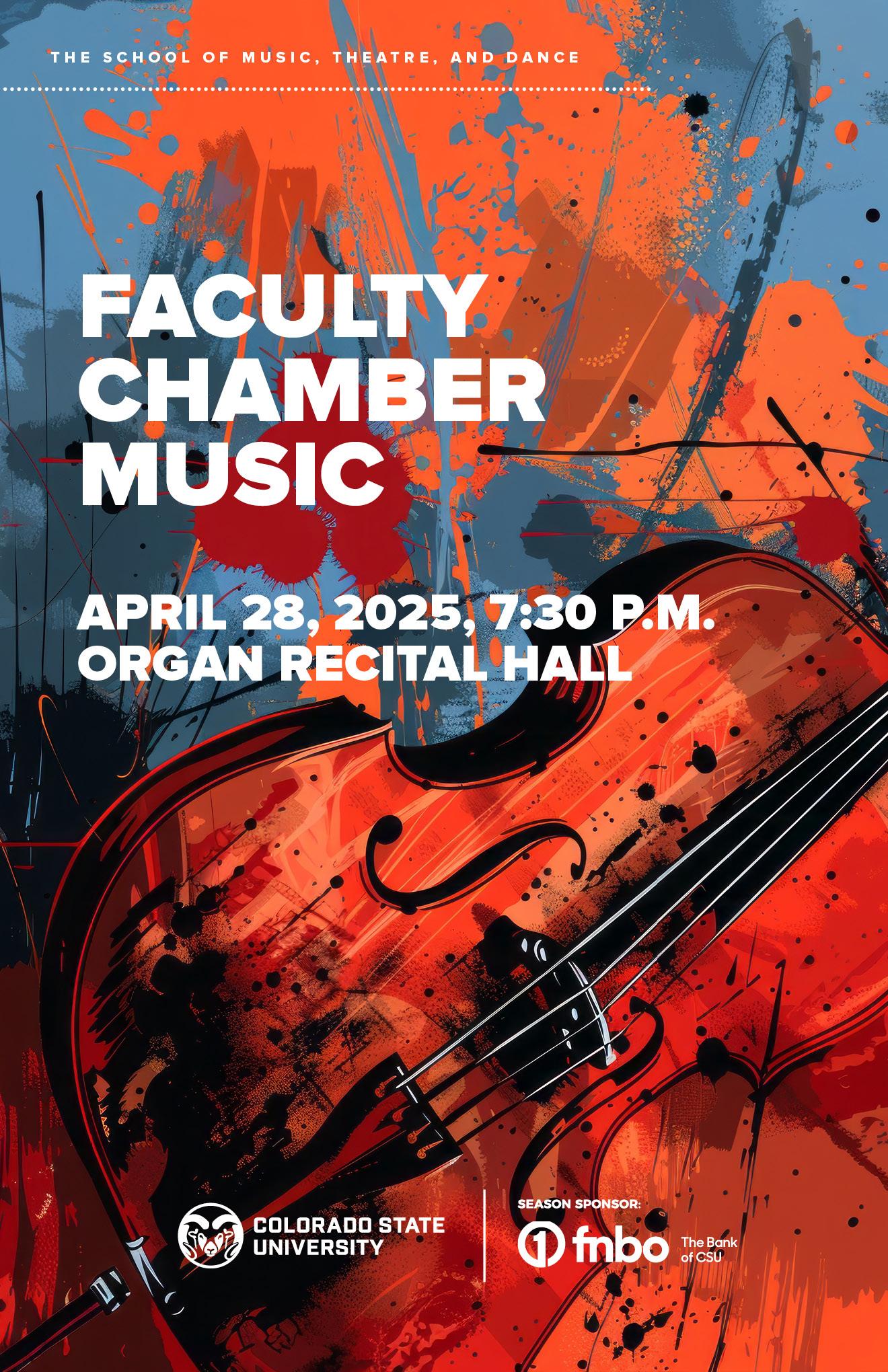
Ricochet (1993)
VIRTUOSO SERIES-FACULTY CHAMBER MUSIC
APRIL 28, 2025 | 7:30 P.M. | ORGAN RECITAL HALL
Ongheya (Premier)
Stan Curtis and Will Hiett, trumpet
John McGuire, horn
Drew Leslie, trombone
Chris Bloom, tuba
Bryan Wallick, Hyeji Seo, Piano 1
Hsin-Hsuan Lin, Juhyun Lee, Piano 2
Piano Quartet No. 3, Op. 60
Allegro non troppo
Scherzo-Allegro
Andante
Finale-Allegro comodo
Ron Francois, violin
Margaret Miller, viola
Meredith Blecha-Wells, cello
Bryan Wallick, piano
INTERMISSION
Quatre Poemes, Op. 5
La Cloche Felee
Dansons la gigue!
“Le son du cor s’afflige vers la bois”
Serenade
Kerry Turner (b. 1960)
Hyunjoo Byon (b. 1974)
Johannes Brahms (1833-1897)
Charles Martin Loeffler (1861-1935)
Nicole Asel, mezzo-soprano
Margaret Miller, viola
Tim Burns, piano
lullaby/ballad/spiritual
Shawn E. Okpebholo (b.1981)
Ysmael Reyes, flute
Galit Kaunitz, oboe
Cayla Bellamy, bassoon
Improvisation on a Blue Theme (1981)
Wesley Ferreira, clarinet
Ron Francois, Ava Pacheco, violins
Margaret Miller, viola
Meredith Blecha-Wells, cello
Forest Greenough, bass
Kathryn Harms, harp
Tim Burns, piano
Eric Hollenbeck, percussion
Rebecca Phillips, conductor
Kerry Turner has become one of the most recognized names, not only in the horn world but also in brass playing in general. Whether as a composer or a performing artist on the horn, he appears regularly on the great concert stages of the world. Major ensembles with whom Kerry performs include the American Horn Quartet, the Virtuoso Horn Duo, and the Luxembourg Philharmonic Orchestra. As a member of these prestigious organizations, he has concertized on four continents. He is also a frequently invited soloist and clinician, having performed and taught in Germany, France, Portugal, Switzerland, Japan, the United States, and the Czech Republic.
A native of San Antonio, Texas, Kerry received his Artist Diploma from the Manhattan School of Music in New York and, as a Fulbright Scholar, continued his studies with Hermann Baumann at the Stuttgart College of Music and Performing Arts. Following his studies, he placed fifth at the Geneva International Horn Competition and won the Bronze Medal at the 39th Prague Spring International Music Competition.
Turner’s compositional career has sky-rocketed over the past several years. His works for horn in combination with virtually every genre of chamber music continue to be heard literally around the world. He has been commissioned by many organizations, including the United States Air Force Heritage of America Band, the Luxembourg Philharmonic, the Japanese Horn Ensemble, and the Richmond, Virginia Chamber Music Society (with Thomas Jöstlein), to name a few. He has been awarded top prizes at the IHS Composition Contest as well as the IBLA Foundation. In his spare time, Kerry sings tenor, studies languages (he is fluent in four and dabbles in a few others), and loves to cook.
Ricochet was commissioned in 1993 by the Freden International Chamber Music Festival in Germany. It was shortly before this commission Mr. Turner composed the first movement, Ricochet, at the request of David Ohanian, at the time the hornist with the Canadian Brass. For the commission, Turner expanded the work to three movements, originally entitled Rodeo, Repose and Ricochet. In the end, the two outer movements were reversed and combined with the middle movement, creating one piece. Ricochet belongs to a compositional period in which Turner exploited his Texan heritage. Other “Texan” works include the Quartet No.3, Kaitsenko and Ghost Riders.
About the Composer: Hyunjoo Byon (b. 1974)
Hyunjoo Byon was born in Seoul, South Korea. She honed her skills in piano and composition at Seonhwa Arts Middle and High School, later specializing in composition at Yonsei University College of Music, where she obtained both her bachelor’s and master’s degrees. Pursuing her passion further, she undertook a diploma course in composition in Freiburg, Germany. Here, she delved deep into the intricacies of modern sound-based composition. Upon her
return to Korea, Byon imparted her knowledge on music theory, composition, and liberal arts at various institutions. Currently, she is a lecturer at the University of Suwon, Yonsei University, and. Jeju National University. Byon has been an active figure in several Korean composers’ associations, showcasing her extensive works in collective recitals organized by these associations. Her musical creations span from contemporary compositions to art songs imbued with Korean poetry. As she continues to push the boundaries of her craft, Byon is exploring innovative ways to express sound in her compositions.
“Ongheya” is a Korean folk song from the Gyeongsang region, traditionally sung during barley threshing. It features a simple melody with multiple verses of lyrics, performed in a call-and-response format.
This piece, also titled “Ongheya”, is written for two pianos and eight hands, structured in three sections. The first section introduces an ostinato in the opening measure, which recurs throughout, combined with traditional rhythmic elements and leaping figures. The second section features a tonal melody and harmonic progressions centered on the note F, supported by folk-inspired rhythmic accompaniment. The third section adopts to a fast tempo, serving as a coda. Each section features in melodic fragments from the original folk song “Ongheya.”
By incorporating elements of Korean folk music, this work explores the expressive potential of two pianos and four pianists. It was dedicated to pianist Hyeji Seo and her fellow faculty members.
La Cloche fêlée (The Flawed Bell) Translation by William Aggeler
It is bitter and sweet on winter nights To listen by the fire that smokes and palpitates, To distant souvenirs that rise up slowly At the sound of the chimes that sing in the fog.
Happy is the bell which in spite of age Is vigilant and healthy, and with lusty throat Faithfully sounds its religious call, Like an old soldier watching from his tent!
I, my soul is flawed, and when, a prey to ennui, She wishes to fill the cold night air with her songs, It often happens that her weakened voice
Resembles the death rattle of a wounded man, Forgotten beneath a heap of dead, by a lake of blood, Who dies without moving, striving desperately.
Dansons la gigue! (Let’s dance the jig!) Translation by Garrett Medlock
Let’s dance the jig!
I loved above all her comely eyes, Clearer than the star of the skies, I loved her malicious eyes.
Let’s dance the jig!
She truly had fashions
To ravage a poor lover, Which was truly charming!
Let’s dance the jig!
But I find still better
The kiss from her mouth in flower
Since she is dead to my heart.
Let’s dance the jig!
I remember, I remember Hours and discussions, And this is the best of my possessions.
Let’s dance the jig!
Le son du cor s’afflige vers les bois (The sound of the horn) Translation by Richard Stokes
The sound of the horn wails towards the woods With an almost orphan sorrow Which fades away at the foot of the hill Amid the gusts of the fierce North wind. The soul of the wolf weeps in that voice Which rises with the setting sun With an almost soothing agony, Which delights and distresses all at once. To muffle better this lament, The snow falls in long strips of lint Across the blood-flecked setting sun, And the air has the air of an autumn sigh, So mild is this monotonous night On which a languid landscape takes its ease.
Sérénade (Serenade) Translation by Corinne Orde
Like the voice of a dead body that might Sing from the depth of its grave, Mistress, listen to my voice, harsh and out of tune, Rising up to your refuge.
Open your soul and your ear to the sound
Of the mandolin:
For you, for you, have I made this song, Cruel and wheedling.
I will sing of your gold and onyx eyes, Pure of all shadows,
Then of the Lethe of your breast, then the Styx Of your dark hair.
Like the voice of a dead body that might Sing from the depth of its grave, Mistress, listen to my voice, harsh and out of tune, Rising up to your refuge.
Then I shall laud highly, as necessary, This blessed body
Whose opulent perfume comes back to me
On sleepless nights.
And to finish, I shall sing of the kiss
Of your red lips,
And your sweetness in making a martyr of me, My angel, my gouge!
Open your soul and your ear to the sound Of the mandolin:
For you, for you, have I made this song, Cruel and wheedling.
Named the 2024 Chicagoan of the Year in Classical Music by the Chicago Tribune and one of Musical America’s Top 30 Professionals of 2023, Nigerian-American composer Shawn E. Okpebholo’s music resonates globally, earning widespread acclaim from critics and audiences alike. His GRAMMY®-nominated solo album, Lord, How Come Me Here?, reimagines Negro spirituals and American folk hymns. The press has described his music as “devastatingly beautiful” and «fresh and new and fearless» (Washington Post), “affecting” (New York Times), “lyrical, complex, singular” (The Guardian), “searing” (Chicago Tribune), “dreamy, sensual” (Boston Globe), and “powerful” (BBC Music Magazine). Okpebholo has garnered numerous accolades, including awards from the Academy of Arts and Letters, the American Prize in Composition, the Music Publishers Association, and ASCAP, and he was the inaugural honoree of the Leslie Adams-Robert Owens Composition Award.
Grants from the National Endowment for the Arts, Chamber Music America, Barlow Endowment for the Arts, Illinois Arts Council, Tangeman Sacred Music Center, The Mellon Foundation, Wheaton College, and many others have supported Okpebholo’s work. Notable commissions include those from the Chicago Symphony Orchestra, United States Air Force
Strings, Copland House Ensemble, Tanglewood, Aspen, and Newport Classical Music Festivals, Philadelphia Chamber Music Society, Imani Winds, Sparks and Wiry Cries, Urban Arias, and the Kennedy Center. His art songs have been performed in concert by the Lyric Opera of Chicago, Los Angeles Opera, Fort Worth Opera, Portland Opera, and Des Moines Metro Opera. His chamber music has been presented by eighth blackbird, Copland House Ensemble, Picosa, Fifth House Ensemble, Lincoln Trio, and others. Orchestras including the Chicago, Cincinnati, and Houston Symphonies and the Lexington Philharmonic have featured his music. Okpebholo has also collaborated with renowned solo artists, including vocalists J’Nai Bridges, Lawrence Brownlee, Rhiannon Giddens, Will Liverman, Michael Mayes, Ryan McKinny, and Tamara Wilson; pianists Aldo López-Gavilán, Mark Markham, Paul Sánchez, and Howard Watkins; and instrumentalists Rachel Barton Pine, Steven Mead, and Adam Walker. His extensive artistic reach has led to regular performances at prestigious venues such as Carnegie Hall, Wigmore Hall, Lincoln Center, Kennedy Center, Kimmel Center, and the Metropolitan Museum of Art.
PBS NewsHour and radio broadcasts across the country, including NPR’s Tiny Desk Concert and Morning Edition, SiriusXM’s Living American series on Symphony Hall Channel, and Chicago’s WFMT, have highlighted Okpebholo’s music. NPR selected his art song The Rain as one of the 100 Best Songs of 2021, one of only a few classical works to make the ranking. His compositions are featured on twelve commercially released albums, three of which are GRAMMY®-nominated.
As a pedagogue, Okpebholo has conducted masterclasses at various academic institutions worldwide, including two universities in Nigeria. His research interests have led to ethnomusicological fieldwork in East and West Africa, resulting in compositions, transcriptions, and academic lectures. He earned his master’s and doctoral degrees in composition from the College-Conservatory of Music (CCM) at the University of Cincinnati. During his upbringing, a significant part of his music education came from The Salvation Army church, where he received free music lessons regularly. Inspired by that altruism, Okpebholo is deeply passionate about music outreach to underserved communities.
Recently, he completed a residency with the Chicago Opera Theater, culminating in the premiere of his opera The Cook-Off, with librettist Mark Campbell (librettist of the Pulitzer Prize-winning opera Silent Night). Currently, he serves as the Jonathan Blanchard Distinguished Professor of Composition at Wheaton College Conservatory of Music and the Saykaly Garbulinska Composer-in-Residence with the Lexington Philharmonic.
Shawn E. Okpebholo is based in Wheaton, IL, a suburb of Chicago, with his wife, violist Dorthy, and their daughters, Eva and Corinne.

